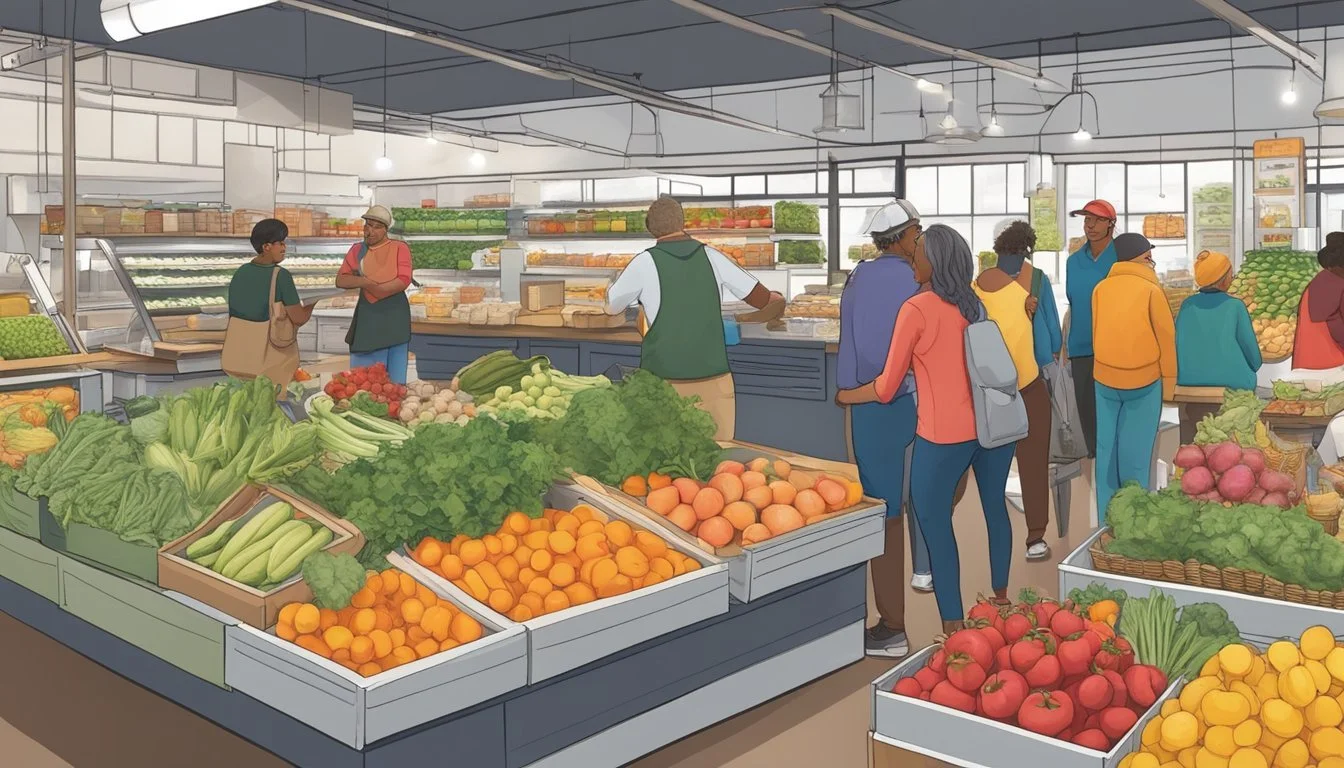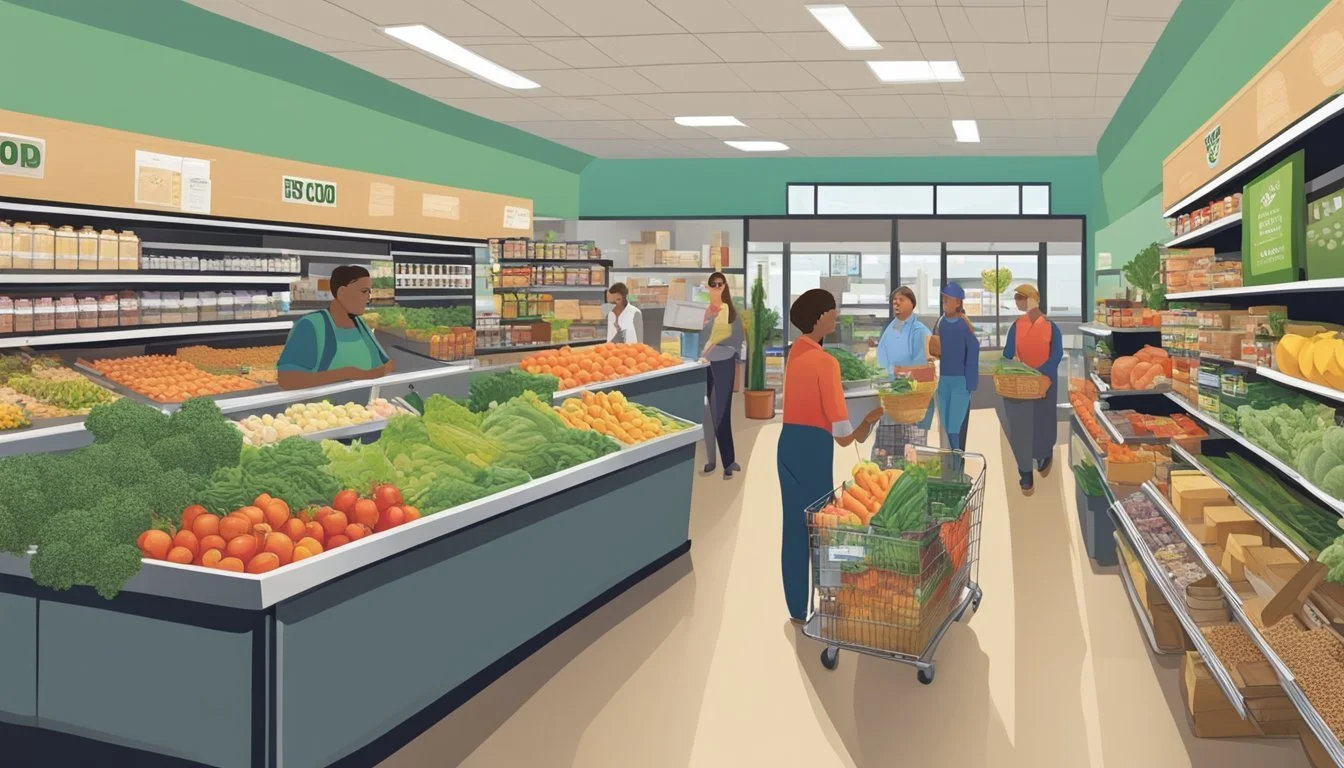Guide to Food Co-Ops in Thornton, CO
Your Local Shopping Compass
Thornton, Colorado, a vibrant community located just north of Denver, offers a unique blend of suburban comfort and local amenities. Among these, food cooperatives, or food co-ops, play an integral role in connecting the community with high-quality, often local and organic produce and groceries. These food co-ops operate on principles of shared ownership and democratic decision-making, allowing members to have a direct influence on the product selection and business practices, fostering a closer bond with the food they consume and the community they inhabit.
In Thornton, food co-ops are not just marketplaces but also gathering spots where people can engage with their neighbors and participate in a more sustainable food model. By supporting these businesses, Thornton residents contribute to a stronger, more resilient local economy, and benefit from a food system that prioritizes not just profits, but the health and well-being of both consumers and producers. The availability of local and organic options through food co-ops and related programs such as community-supported agriculture (CSA) initiatives is evident in Thornton's commitment to real food and real community.
The cooperative model extends beyond just food cooperatives in Thornton, as the region is home to various initiatives that address food security through pantries and assistance programs. These programs ensure that all community members have access to nutritious food, contributing to Thornton's inclusive and supportive atmosphere where everyone has the chance to thrive.
The Basics of Food Co-Ops
Food co-ops offer community members an opportunity for shared ownership and participation in a democratically run grocery business that focuses on local and sustainable sourcing.
Understanding Co-Ops
A food co-op, or cooperative, operates on a principle of shared ownership among its members. In Thornton, CO, as in other places, these cooperatives are typically structured as legal entities where members have a stake in the business. Membership involves purchasing a share, which grants the individual a voice in decisions such as product sourcing and organizational governance. Unlike conventional grocery stores, which prioritize profits for distant investors, co-ops reinvest in their local communities and prioritize cooperation among members for mutual benefit.
Benefits of Joining
There are several benefits for Thornton residents who join a local food co-op:
Community Engagement: Members become part of a community that actively shapes the food co-op's policies and product offerings.
Economic Participation: Financial benefits include potential dividends based on patronage, not capital investment.
Local and Ethical Sourcing: Food co-ops often focus on supplying locally produced and ethically sourced goods, which supports regional producers and contributes to the local economy.
Health and Education: Co-ops typically promote healthy living by providing access to fresh, organic produce and offering educational resources on nutrition and sustainable consumption.
Cooperatives operate with the community’s interests at heart, leveraging collective buying power and shared values to deliver high-quality food and consumer goods.
Local Food Systems and Co-Ops
Food cooperatives, or co-ops, in Thornton, CO, serve an essential role in bolstering local food systems. They not only provide a marketplace for local farmers but also significantly contribute to the local economy through various initiatives.
Supporting Local Farmers
Food co-ops in the Thornton area place a strong emphasis on sourcing products from local farms. This supports small farmers by offering them a stable outlet for their produce, which is particularly valuable for those without the capacity to compete with larger, commercial farms. By maintaining direct relationships with these producers, co-ops ensure that consumers receive fresh, locally-grown produce, strengthening the community's connection with local food sources.
Farmers' Benefits:
Steady demand
Fair pricing
Local exposure
Impact on Local Economy
The relationship between food co-ops and the local economy goes beyond the simple transaction of goods. These co-ops reinvest in the community through local wages and by potentially distributing patronage dividends to members in profitable years. The economic impact is substantial, as they are known to do 2.5 times more business with local entities compared to conventional grocers.
Economic Contributions:
Local job creation
Sustaining rural economies
Support for local markets
Membership and Ownership
When one joins a food co-op in Thornton, CO, they become both a member and an owner, investing in a business that offers economic benefits and operates democratically.
Becoming a Member
Individuals can become members of a food co-op by paying a membership fee or making a refundable capital investment. In Thornton, such an investment might typically be around $100, plus a small join fee. To maintain membership, individuals might also need to contribute volunteer hours or participate in the co-op's governance.
Member Benefits and Responsibilities
Members can expect both financial and participatory dividends from their investment. Financially, they might receive annual patronage dividends based on the co-op's profits and their personal purchase history. Additionally, members often enjoy discounts on products. As owners, members have the responsibility to contribute to the co-op's well-being, potentially by volunteering or engaging in business decisions. These contributions support the co-op's economic sustainability and enable members to influence the business direction.
Health and Sustainability
In Thornton, CO, food co-ops are pivotal in promoting health through access to organic and natural products while taking strides in environmental responsibility. These co-ops not only support individual well-being but also contribute to broader sustainable practices that address climate change and build ecological resilience.
Organic and Natural Products
Food co-ops in Thornton prioritize offering a variety of organic produce and foods. By doing so, they meet the growing consumer demand for items that are free from synthetic pesticides and genetically modified organisms (GMOs). Organic food provided by these co-ops is sourced with a commitment to organic agriculture, which supports the health of the planet. Buyers can find everything from seasonal fruits and vegetables to a broad range of natural groceries that adhere to rigorous standards.
Healthy Food Options: These include whole grains, dairy alternatives, and plant-based proteins.
Organic Produce: Seasonally rotated to ensure freshness and support local farms practicing sustainable agriculture.
Environmental Responsibility
Thornton's food co-ops engage in multiple environmental responsibility initiatives. These cooperatives implement zero-waste policies where possible, aiming to significantly reduce their environmental impact. By systematically recycling materials and composting food waste, they outperform conventional grocers in waste management.
Recycling Efforts:
Cardboard: Approximately 96% recycled.
Plastics: An ambitious 81% recycling rate.
Composting: A robust program that diverts 74% of food waste from landfills.
Additionally, food co-ops in Thornton are often at the forefront of supporting a diverse range of local producers, which fosters an equitable and resilient local economy. They prioritize partnerships that adhere to sustainable practices and support the community's health, fully embracing the intersection of environmental responsibility and diversity.
Economic and Social Aspects
Food co-ops in Thornton, CO, serve as key instruments for economic and social transformation within the community, influencing local economy and food security through equitable and socially responsible practices.
Economic Empowerment
Food co-ops significantly contribute to the local economy by providing a platform for economic empowerment. They enhance the economic vitality of the community by:
Supporting Local: Food co-ops prioritize local farmers and producers, keeping resources within the community.
Creating Jobs: They offer employment opportunities that often focus on fair labor practices and living wages.
Community Involvement and Education
The role of food co-ops transcends mere commerce, as they actively engage in:
Educational Initiatives: They provide resources and education on nutrition, sustainable practices, and food preparation to the community.
Community Engagement: Co-ops act as community hubs, fostering social connections and working together with members to address food security, social justice, and environmental concerns.
Donations and Social Responsibility: Many co-ops donate a portion of profits to local causes or host events that highlight social issues, thereby strengthening community ties.
Shopping at a Food Co-Op
When they shop at a food co-op in Thornton, CO, customers will enjoy high-quality, fresh products often sourced locally, including items like meat, dairy, tea, and coffee. The atmosphere tends to be community-oriented, offering a unique selection of delicious food.
Finding a Local Co-Op
Thornton co-op shoppers can locate a nearby cooperative store using resources like LocalHarvest and the Co-op Directory Service. These platforms provide comprehensive listings and maps. The National Co+op Grocers is another valuable resource that serves as a cooperative for cooperatives, helping to strengthen purchasing power and providing operational support for food co-ops.
Visit LocalHarvest.org to find co-ops by entering the Thornton zip code.
Check the Co-op Directory Service at coopdirectory.org.
Look up Thornton co-ops that are part of the National Co+op Grocers network.
Navigating the Store
Upon entering a Thornton food co-op, they will likely encounter an array of grocery items that prioritize quality and community engagement. Here are some tips for navigating the store:
Produce: Expect to find a variety of fresh fruits and vegetables, with a focus on seasonal and local produce.
Meat & Dairy: Meat products are typically sourced from local farmers ensuring ethical standards, while dairy items come from nearby dairies renowned for their quality.
Bulk Items: Buying in bulk can offer significant savings. Co-ops often provide grains, nuts, seeds, tea, and coffee in bulk bins.
Specialty Foods: A selection of unique and artisanal foods, including special dietary options like gluten-free or vegan, are usually available.
Community Programs: Many co-ops run educational events, cooking classes, and other community-focused programs.
Fresh food: Food co-ops emphasize the sale of fresh, often organic products.
Product Placement: Items are typically arranged to highlight seasonal goods and the work of local producers.
Labels: Co-ops often label products clearly with origin and producer information, making it easier to shop consciously.
To ensure a smooth shopping experience, customers can familiarize themselves with the store's layout, which is often designed to feature new, local, and seasonal items prominently. The staff at co-ops are generally well-informed and can provide guidance on the products, as well as information about the local producers and the benefits of co-op membership.
Differences from Conventional Grocers
Food cooperatives in Thornton, CO, offer a distinct approach to grocery shopping when compared to conventional grocers. Their pricing strategies and product assortments are tailored to benefit their members and local communities.
Pricing and Discounts
Food co-ops often provide a pricing structure that supports affordable access to quality products. They may offer various discounts, such as member-only deals and volume discounts. Unlike traditional supermarkets which may use discount tactics like coupons and weekly sales to attract short-term business, co-ops focus on consistent, long-term value for their members.
Product Selection
The product selection at a food co-op differs significantly from that of conventional grocery stores. Co-ops tend to prioritize a diverse array of sustainable and locally-sourced goods. In contrast, traditional grocery stores typically offer a wider variety of national brands and conventional products, which may not always align with sustainability or local sourcing practices.
Community Engagement
Community involvement in Thornton, CO, is significantly strengthened through the engagement of community-owned setups and volunteer-run initiatives focused on addressing food insecurity and supporting economic development while minimizing food waste.
Volunteering and Community Services
Thornton offers a variety of opportunities for individuals to volunteer and contribute to community services. Local food pantries, often relying on a dedicated volunteer workforce, encourage community members to donate their time and energy to support those in need. Such engagement ensures that essential services, like the distribution of food to low-income families, are possible. The volunteer activities not only support the food pantries but also contribute to broader economic development within Thornton by fostering a community-based support system.
Key volunteering activities include:
Sorting and organizing food donations
Assisting with food distribution days
Educational outreach on nutrition and SNAP (Supplemental Nutrition Assistance Program)
Volunteers are essential in mitigating issues such as food apartheid, which affects diverse communities, including the Black community, by ensuring equitable access to nutritious food.
Supporting Food Access Initiatives
Thornton's food co-ops and pantries play a crucial role in supporting food access initiatives aimed at serving various communities, from low-income to diverse populations. These entities work towards a more food-secure community by accepting SNAP benefits, thereby enabling low-income residents to afford healthy food options. They address the needs of food-insecure populations by providing fresh produce, dairy, and bread, among other nutrition items.
Notably, these initiatives include:
Community-Owned Grocery Solutions: Promoting local ownership and economic growth.
Food Pantries' Distribution Days: Specialized programs designed to deliver food effectively to those in need.
Education on Food Waste: Highlighting the importance of reducing food waste as part of sustainable community development.
Educational Outreach
Food co-ops in Thornton, CO, offer a robust educational outreach program focusing on healthy eating habits, sustainable agriculture, and the importance of fair trade. These programs are integral to fostering a well-informed community that values good food and the ways it reaches their tables.
Workshops and Classes
The local co-ops organize a variety of workshops and classes aimed at all age groups. Participants can learn about organic agriculture and its environmental benefits compared to conventional farming methods. Cooking classes are also available, teaching both basic and advanced culinary skills, with an emphasis on using organic and fair trade-certified ingredients. These hands-on workshops offer practical knowledge that can be applied in day-to-day life.
Sample workshops offered include:
Cooking with Organic Produce
Starting Your Own Vegetable Garden
Understanding Fair Trade Certification
Promoting Food Knowledge
Promotion of food knowledge is a key aspect of the educational outreach provided by Thornton's food co-ops. The programs are designed to increase awareness about where food comes from and the impact of one's choices on health and the environment. They also dive into the intricacies of fair trade certification, helping consumers understand how their purchases support ethical and sustainable practices globally.
Initiatives to promote food knowledge include:
Monthly newsletters highlighting seasonal produce and sustainable farming techniques
In-store displays and information boards featuring good food choices and their benefits
Educational materials provided to schools to integrate into their curriculum
Support Networks and Resources
In Thornton, Colorado, food co-ops benefit from a robust array of support networks and resources that bolster both local food systems and community connections. These resources offer vital organizing structures for small businesses and bring together growers and consumers around shared goals of sustainability and economic resilience.
Local and National Organizations
Local and national organizations play an integral role in supporting food co-ops in Thornton. Food banks and assistance programs often serve as a nexus for organizing community efforts and providing aid to those who need it. Thornton Community Food Bank, a local entity, is an example of a resource that helps individuals and families access food. Likewise, national organizations like National Co+Op Grocers offer support and resources to food co-ops across the country, helping them to maintain quality standards and achieve economies of scale.
Resources for Food Co-Ops in Thornton:
Community Food Banks: Aiding with food security and local partnerships.
National Co+Op Grocers: Supporting with education, marketing, and purchasing power.
Small Business and Farmer Networks
Connections between small businesses and local farmers are essential for food co-ops, providing the foundation for a sustainable supply chain of fresh, local produce. Networks such as LocalHarvest make it easier for food co-ops to find and partner with local small-scale farmers and producers. This collaborative dynamic helps maintain the co-op's commitment to supporting independent, locally-owned businesses, ensuring that consumers have access to the freshest food while contributing to the local economy.
Networks Strengthening Thornton's Food Co-Ops:
LocalHarvest: Connecting co-ops with local farmers for fresh produce.
Independent Networks: Offering platforms for small businesses to collaborate and thrive.
The Future of Co-Ops
The landscape for food co-operatives in Thornton and beyond is evolving to address modern challenges. As consumer awareness and values shift, co-ops are responding by emphasizing sustainability, community involvement, and local sourcing.
Future co-ops are expected to integrate technology for better efficiency, from inventory management to online ordering systems. Social media and digital marketing will become vital for community engagement and for relaying the co-operative principles to a broader audience.
Sustainability: Emphasizing eco-friendly practices and reducing waste.
Education: Providing learning opportunities about healthy food choices and environmental impact.
Local Sourcing: Strengthening local food systems by partnering with area farmers and producers.
Member participation will remain a cornerstone. Co-ops will likely increase transparency in decision-making, welcoming a greater member role in governance.
Trend Impact on Co-Ops Technological Advancements Streamlined operations and customer convenience Localism Enhanced support for local economies Environmental Consciousness Eco-friendly practices and reduced carbon footprint
In essence, food co-ops in Thornton will serve as hubs of innovation and community resilience, reflecting the collective will to foster healthier, more sustainable food systems. With a foundation built on cooperative principles, they stand to grow in relevance as societal values continue to realign towards cooperative models of business and community development.













